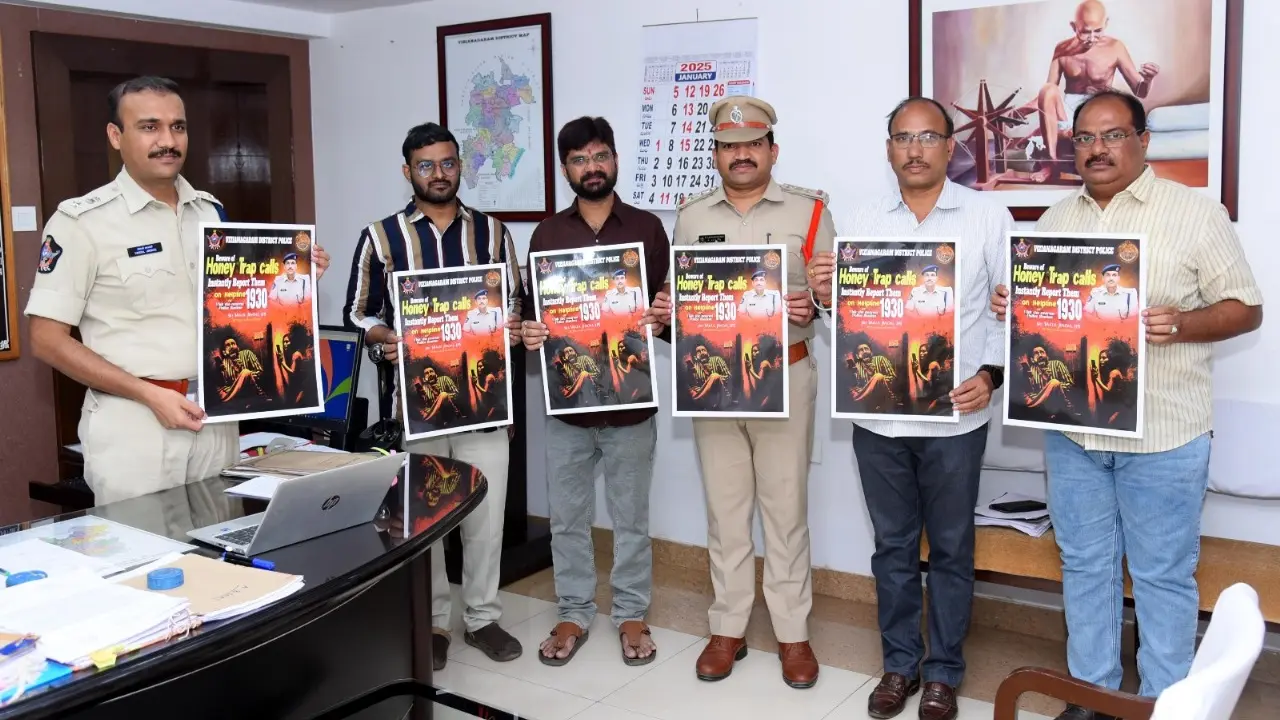Andhra Pradesh Police initiate awareness campaign on cyber scams involving ‘honey traps’

Vizianagaram District Superintendent of Police Vakul Jindal advised the public to be aware of the growing threat of “honey traps” in an attempt to protect the community from hackers. In order to extract money from victims, scammers take advantage of phone conversations and social media.
To inform the public of the risks associated with these schemes, the district police have prepared an awareness film. SP Jindal stressed the importance of being alert and exercising caution when interacting with strangers online during his remarks at the police office’s launch event. He said, “A lot of hackers utilize deceptive tactics, like video calls and women’s display photos (DPs), to trick people into falling into traps. Everyone must remain vigilant and avoid becoming a victim of these scams.
Table of Contents
ToggleUsing Short Films to Increase Awareness
The Vizianagaram police department has created a number of short films to inform the public about several internet frauds as part of their continuous effort to fight cybercrime. One of these movies, *HoneyTrap*, shows how cybercriminals work and offers helpful advice on how to stay away from such scams. The terrible effects that these crimes can have on victims—such as monetary losses and psychological anguish—are also covered in the video.
SP Jindal emphasized that in order to reach a wider audience, these films will be extensively circulated on social media. “With these short films, we hope to educate people about the strategies employed by cybercriminals and give them the tools they need to defend themselves,” he stated.
The Operation of Honey Traps
In a classic honey trap scam, scammers talk to victims over the phone, WhatsApp, or video calls, frequently pretending to be someone looking for a love or intimate relationship. They force victims to share private images or engage in intimate talks after building trust. After turning this footage into obscene material, the criminals threaten to post it online or distribute it to the victim’s contacts unless a ransom is paid.
These thieves use embarrassment and terror as leverage to demand money. Sadly, some victims have experienced extreme emotional suffering as a result of these threats, and some have even turned to suicide, Jindal said.
How to Keep Yourself Safe
SP Jindal offered insightful guidance to protect the people against honey trap frauds:
- Avoid connecting with strangers online: Exercise caution while corresponding with strangers on messaging apps and social media.
- Avoid sharing explicit or personal content: Avoid sending private images or videos to strangers in particular.
- Report threats immediately: Call the cybercrime helpline at 1930, use the cybercrime portal, or get in touch with your local police station if you are being targeted by cybercriminals.
He encouraged the public that they should report such events to the police right away rather than being afraid of these scammers. “The police are available to assist you. If you come across any threats or questionable activity online, don’t be afraid to get in touch,” he advised.
Recognizing Work
SP Jindal expressed his appreciation to the awareness video’s creative team. He gave a certificate of recognition to P. Hari, who acted in the short film, and commended FX Media from Visakhapatnam for their production efforts. He said, “These efforts are essential in raising awareness and enabling the public to fight cybercrime.”
Closing statement
The preventive actions taken by the Vizianagaram police highlight how crucial community knowledge is in combating cybercrime. Initiatives like the *HoneyTrap* film serve as a timely reminder to remain cautious and watchful in an increasingly digital world, especially in light of the growing number of online fraud instances. In order to help the police in their efforts to make the internet a safer place for everyone, the public is urged to spread these awareness messages.




